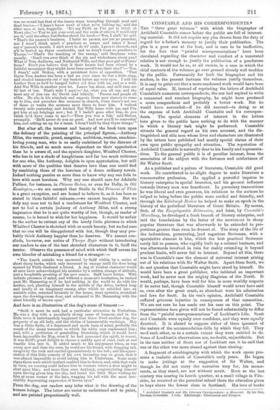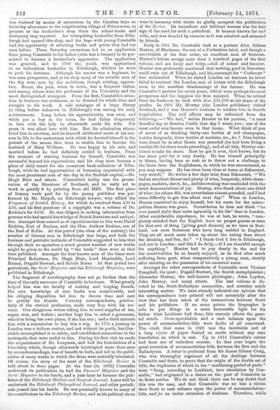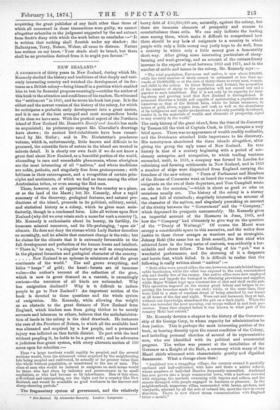CONSTABLE AND HIS CORRESPONDENTS.*
THE "three great volumes" with which the biographer of Archibald Constable comes before the public are full of interest- ing material. It did not require any plea drawn from the duty of regard for a father's memory to justify their publication. The plea is a poor one at the best, and is sure to be ineffective, for the fact that "painful misrepresentations" have been circulated regarding the character and conduct of a venerated relative is not enough to justify the publication of a ponderous- work. It would not be so, at all events, in a case in which the chief contents of the volumes go over ground already well trodden by the public. Fortunately for both the biographer and his readers, in the present instance the volumes justify themselves.. It is easy to point out that a more condensed work would have been of equal value. If, instead of reprinting the letters of Archibald Constable's numerous correspondents, the son had aspired to write a connected and succinct biography, he might have produced a more compendious and probably a better work. But he would have succeeded—if he did succeed—in doing so at- the expense of both Archibald Constable and his correspon- dents. The special elements of interest in the letters he-re given to the public llave nothing to do with the manner in which a literary task might be performed. Constable- attracts the general regard on his own account, and the dis- tinguished and able men whose lives and characters are illustrated by the letters here published had mostly special claims of their own upon public sympathy and attention. The reputation of Archibald Constable is naturally dear to his family and representa- tives. To the general public it is of peculiar interest, from the- association of the subject with the fortunes and misfortunes of Sir Walter Scott.
As a publisher and a patron of literature, Constable did good work. He contributed in no slight degree to make literature ta remunerative profession. He applied a powerful impetus to. literary enterprise in special branches, and his general influence towards literary men was beneficent. In pecuniary transactions 'he was liberal and even generous, his relations to the authors be- helped to bring before the public were cordial and friendly, and through the Edinburgh Review he helped to make an epoch in the, history of the periodical literature of Great Britain. By means, first, of the Encyavxdia Britannica, and later, by Constable's Miscellany, he developed a fresh branch of literary enterprise, and laid the foundations by the latter of the movement in cheap- popular literature that was afterwards to be extended to pro- portions greater than even he dreamt of. The story of the life of the industrious, persevering, :and sagacious Scotsman, with a speculative element in him, which the best practical Scotsmen rarely fail to posiess, who rapidly built up a colossal business, and was afterwards involved in ruin for rashly extending it beyond prudent limits, will never fail to interest. Beyond all this, there- was in Constable's case the element of universal interest arising out of his relations with Sir Walter Scott. Apart from Scott, we- do not question that Constable might have stood by himself. He- would have been a great publisher, who initiated an important work, had he never met the mighty Magician of the North. It would, perhaps, have been well for him in mere worldly respects. if he never had, though Constable himself would never have said so, even after the great mush, so abundant were his admiration and love for Scott. In his eon's opinion, Archibald Constable suffered grievous injustice in consequence of that connection.. We are not sure he has made out his case on this point. The representations here given will not be found substantially to differ from the "painful misrepresentations" of Lockhart's Life. Scott- and Constable were equally over-confident, and they were equally deceived. It is absurd to suppose either of them ignorant of the nature of the accommodation-bills by which they fell. They used each other, as to a certain extent they were entitled to do.. Some of Lockhart's observations are, no doubt, unjustifiable. But. in the case neither of Scott nor of Lockhart can it be said that. one or the other was more sinned against than sinning.
A fragment of autobiography with which the work opens pre- sents a realistic sketch of Constable's early years. He began to make jottings at the suggestion of Sir Walter, and though he did not carry the narrative very far, his memo- randa, as they stand, are not without merit. Born as the last century was nearing its fourth quarter, at a small village in Fife- shire, he received at the parochial school there the education given to boys above the lowest class in Scotland. His love of hooka
Archibald Constable and His Literary Correspondent.: a Memorial. By his Son, Thomas Constable. 3 vols. Edinburgh: Edmonston and Douglas.
was fostered by means of excursions by the Carnbee boys on Saturday afternoons to the neighbouring village of Pittenweem, to procure at the bookseller's shop there the school-books and stationery they required. An enterprising bookseller from Edin- burgh had opened this shop, and the bp with young Constable had the opportunity of admiring books and prints they had not seen before. These Saturday excursions led to an application from young Constable to his father (who was a farmer) to be per- mitted to become a bookseller's apprentice. The application ' was granted, and in 1788 the youth was apprenticed to an industrious bookseller in Edinburgh, whither he went to push his fortunes. Although his master was a beginner, he was soon prosperous, and at his shop many of the notable men of the day were seen by the ambitious, though retiring, appren- tice. Burns, the poet, when in town, was a frequent visitor, and among others were the professors of the University and the most distinguished strangers. From the first, Constable's atten- tion to business was assiduous, as he devoted his whole time and energies to his work. A sale catalogue of a large library (a thing before unknown in Edinburgh) was among his early achievements. Long before his apprenticeship was over, and while yet a boy in his teens, be had fallen desperately in love with the lady he afterwards made his wife. For years it was silent love with him. But his admiration stimu- lated him to exertion, and he himself attributed much of his suc- cess in life to the earnestness with which he devoted himself to the pursuit of the means that Were to enable him to become the husband of Mary Willison. He was happy in his suit, and married before he had definitely settled in business. From the moment of starting business for himself, Constable was successful beyond his expectations, and his shop soon became a place of daily resort for the numerous book-collectors of Edin- burgh, while he had opportunities of becoming acquainted with the most prominent men of the day in the Scottish capital,—Dr. Hugh Blair and others. Constable's hobby was the preser- vation of the literature of Scotland, and he early set to work to gratify it by printing from old MSS. The first piece of literary work paid for by the young publisher was per- formed by Mr. Dalyell, an Edinburgh lawyer, who edited the Fragments of Scottish History, for which he received from £20 to 130, and his first purchase of a copyright was a volume Of Dr. Erskine's for 1100. He was diligent in seeking information from persons who had special knowledge of Scotch literature and antiqui- ties. Amongst those named as of especial service to him were David Erskine, Earl of Buchan, and the Hon. Andrew Erskine, son of the Earl of Kerne. At this period (the close of the century) the slumber of literary men in Edinburgh was large, and both the business and patriotic instincts of Constable suggested to him that through their co-operation a much greater number of new works might be given to the world by "the trade" than were at that time published. Amongst the best known men of the times were Principal Robertson, Dr. Hugh Blair, Lord Monboddo, Lord Karnes, Dugald Stewart, and Robert Burns. At that period two periodicals, the Scots' Magazine and the Edinburgh Magazine, were published in Edinburgh.
'The fragment of autobiography does not go farther than the time of the early successes of Constable in business. What greatly helped him was his faculty of making and keeping friends. His own knowledge of rare books was considerable, and his obliging disposition led him to devote time and care to gratify his friends. Country correspondents, particu- larly of the clerical profession, made very free with his ser- vices. One clergyman writes asking him to send supplies of tea, eager, wax, and wafers ; another begs him to select a governess, who is to bring her own piano, if she has one ; and a third entrusts Cm with a commission to buy him a wig. In 1795 a journey to London was a tedious matter, and not without its perils, but Con- etable accomplished it in safety, and established connections in the metropolis that were useful to him. During his first visit he made the acquaintance of Mr. Longman, and laid the foundations of a friendship which, though afterwards interrupted more than once by misunderstandings, was of benefit to both, and led to the publi- cation of many works in which the firms were mutually interested. Of course, the story of the start of the Edinburgh Review is told afresh in these pages. At the time (in 1802) Constable undertook its publication he had the Farmers' Magazine and the Scots' Magazine in his hands, and a year later he became the pub- lisher of the Edinburgh Medical and Surgical Journal. Later still he undertook the Edinburgh Philosophical Journal, and other periodi- cals passed into his hands. He was personally known to many of the contributors to the Edinburgh Review, and as his political views were in harmony with theirs he gladly accepted the publication of the Review. Its immediate and brilliant success was the best sign of the need for such a periodical. It became known far and wide, and was dreaded by enemies as it was admired and esteemed by friends.
Early in 1804 Mr. Constable took as a partner Alex. Gibson Hunter, of Blackness, the eon of a Forfarshire laird, and though a convivialist of the first order, an excellent man of business. Hunter's letters occupy more than a hundred pages of the first volume, and are lively and witty,—full of colour and humour. Hunter was profoundly convinced that nothing good in literature could exist out of Edinburgh, and his:contempt for " Cockneys " was unbounded. When he visited London on business he never failed to contrast the London men of letters with the Edinburgh ones, to the manifest disadvantage of the former. He was Constable's partner for seven years, which were perhaps the most prosperous and the happiest the firm enjoyed. When he retired from the businesi, he took with him £21,000 as his share of the profits. In 1806 Mr. Murray (the London publisher) visited Scotland, and it was Hunter's business to initiate him in Scotch hospitalities. The evil effects may be estimated from the following :—" We had," writes Hunter to his partner, "a most dreadful day at Brechin Castle that day I wrote you ; one of the most awful ever known even in that house. What think of you of seven of us drinking thirty-one bottles of red champagne, besides burgundy, three bottles of madeira, &c., &c.? Nine bottles were drunk by us after Mauls was pounded (he had been living a terrible life for three weeks preceding), and of all this, Murray con- trived to take his share. How he got it over, God knows, but he has since paid for it very dearly. He has himself principally to blame, having been so rash as to throw out a challenge to the Scots from the Englishmen, in which he was encountered, as you may suppose. He has since been close at home at Eskmount, very unwell." He writes a few days laterfrom Eskmonnt, "We had an excellent dinner and plenty of wine, burgundy, white cham- pagne, madeira, claret, &c., and the evening was concluded with the usual demonstrations of joy. Murray, who drank about one-third of what the others did, was nevertheless almost pounded, and I had some difficulty to get him afloat next day." When in London, Hunter contrived to enjoy himself, but his scorn for the metro- politan dinners was great. Nevertheless he does not think "he ever passed eight days more agreeably in his life" than in London. After considerable experience, he was at last, he wrote, "com- pletely satisfied that the English have no proper genius orturn for that sort of thing [giving good dinners] as we have in Scot- land, nor even Scotsmen who have long resided in England. They are all much more taken up about the eating than about the drinking, and fan, &c." "I thank God I live in Edinburgh, and not in London ; and this I do daily,—if I am thankful enough for anything." Hunter had to pay dearly in the end for the convivialities he so keenly enjoyed, as he died after much suffering from gout, when comparatively a young man, shortly after entering on the possession of his ancestral acres.
Amongst the other correspondents of Constable were Thomas Campbell, the poet ; Dugald Stewart, the Scotch metaphysician ; Alexander Murray, the well-known philologist ; John Leyden, John Murray, and many others. The last volume is de- voted to the Scott-Ballantyne connection, and contains much interesting matter. We have already indicated our opinion that the correspondence here printed will not materially alter the view that has been taken of -the transactions between Scott and his publishers. If on some points the biographer is able to put things in a more favourable light for his father than Lockhart had done, this scarcely affects the gene- ral result. Over-speculation and a rash reliance upon the power of accommodation-bills were faults of all concerned. The crash that came in 1826 was the inevitable end of a long re'gime of paper floated on credit without any sure foundation on which to rest. Up to 1811 Constable's career had been one of unbroken success. In that year began the great extension of accommodation-bills between the firm and the Ballantynes. A letter is produced from Sir James Gibson Craig, who was thoroughly cognisant of all the dealings between Constable and Scott, to prove that the origin of the double set of bill; the duplicates of which in the " maddening period of panic" were "flung, according to Lockhart, into circulation by Con- stable," had originated in a desire on the part of Constable to do Scott service. We do not think there can be any doubt that this was the case, and that Constable was no leas a victim than Scott to rash reliance upon the power of accommodation- bills, and to an undue extension of business. Therefore, while
acquitting the great publisher of any fault other than those of which all concerned in these transactions were guilty, we cannot altogether subscribe to the judgtnent suggested by the sad extract from Scott's diary with which the work before us concludes :—" It is written that nothing shall flourish under my shadow ; the Ballantynes, Terry, Nelson, Weber, all came to distress. Nature has written on my brow, 'Your shade shall be broad, but there shall be no protection derived from it to aught you favour.'"




































 Previous page
Previous page